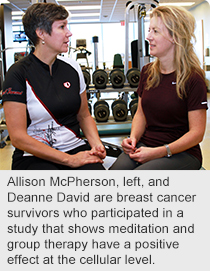
November 6, 2014
Story and photo by Greg Harris
When she was first diagnosed with breast cancer in 2008, Calgarian Allison McPherson says she felt like “a deer in the headlights” with the initial bombardment of information and offers of support from the medical community.
“My initial instinct was to turtle – I didn’t want to talk about it,” McPherson says. “But we are all capable of being overcome and it humbles you. You realize you can’t do it alone.”
McPherson eventually joined a research study that tracked several other breast cancer survivors involved in a group practising mindfulness meditation.
 Today the results of that study have shown that meditation or being involved in a support group do more than just make you feel better psychologically – they have a positive physical impact at the cellular level.
Today the results of that study have shown that meditation or being involved in a support group do more than just make you feel better psychologically – they have a positive physical impact at the cellular level.
A group working out of Alberta Health Services’ Tom Baker Cancer Centre and the University of Calgary Department of Oncology has demonstrated that telomeres – protein complexes at the end of chromosomes – maintain their length in breast cancer survivors who practise meditation or are involved in support groups, while they shorten in a comparison group without any intervention.
Although the disease-regulating properties of telomeres aren’t fully understood, shortened telomeres are associated with several disease states, as well as cell aging, while longer telomeres are thought to be protective against disease.
“For the first time, we have evidence that psychosocial interventions like mindfulness meditation can influence key aspects of biology,” says Dr. Linda E. Carlson, principal investigator and director of research in the Psychosocial Resources Department at the Tom Baker Cancer Centre.
“It was surprising that we could see any difference in telomere length at all over the three-month period studied,” says Dr. Carlson, who is also a U of C professor in the Faculty of Arts and the Cumming School of Medicine, and a member of the Southern Alberta Cancer Institute.
“Further research is needed to better quantify these potential health benefits, but this is an exciting discovery that provides encouraging news.”
A total of 88 breast cancer survivors who had completed their treatments for at least three months were involved for the duration of the study. The average age was 55 and most participants had ended treatment two years prior. To be eligible, they also had to be experiencing significant levels of emotional distress.
In the Mindfulness-Based Cancer Recovery group, participants attended eight weekly, 90-minute group sessions that provided instruction on mindfulness meditation and gentle Hatha yoga, with the goal of cultivating non-judgmental awareness of the present moment. Participants were also asked to practise meditation and yoga at home for 45 minutes daily.
In the Supportive Expressive Therapy group, participants met for 90 minutes weekly for 12 weeks and were encouraged to talk openly about their concerns and their feelings. The objectives were to build mutual support and to guide women in expressing a wide range of both difficult and positive emotions, rather than suppressing or repressing them.
The participants randomly placed in the control group attended one, six-hour stress management seminar.
All study participants had their blood analysed and telomere length measured before and after the interventions.
Study participant Deanne David was placed in the mindfulness group.
“Being part of this made a huge difference to me,” she says. “I think people involved in their own cancer journey would benefit from learning more about mindfulness and connecting with others who are going through the same things.”
The research was funded by the Alberta Cancer Foundation and the Canadian Breast Cancer Research Alliance.
Calgary-area cancer patients can access information about Alberta Health Services programs in both mindfulness meditation and supportive expressive therapy, as well as other support programs at the Tom Baker Cancer Centre, by calling 403-355-3207.